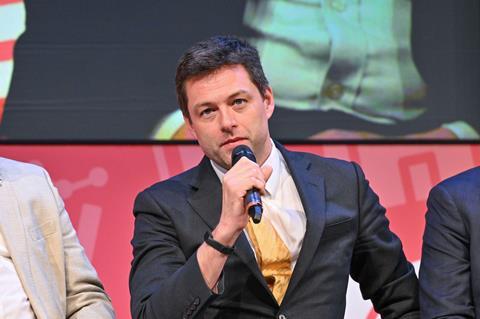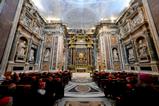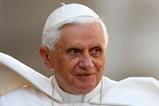Chris Coghlan, a Catholic MP was publicly refused communion for voting in favour of assisted dying. Jack Valero explores what the Catholic Church teaches about denial of the Eucharist, mortal sin and conscience

The MP for Dorking and Horley, Chris Coghlan, has been publicly barred from taking communion by Fr Ian Vane, his local parish priest.
Mr Coghlan had stated that he would vote in favour of the assisted dying bill at its third reading stage. The priest warned him that voting in favour would constitute “obstinately persevering” in sin and result in exclusion from communion.
After the vote, the priest announced his intention to deny him communion at several masses at which the MP was not present. The intended purpose was not to punish Mr Coghlan but to help him reconsider his support for assisted suicide, so that he may be reconciled and return to receiving the Eucharist. The priest also wanted to show to other Catholics that this was a very serious matter: it is a grave sin to support or take part in assisted suicide.
Coghlan has since described the priest’s action as a threat, as coercion and as the church unduly interfering in the political process.
Fr Vane on the other hand has had a lot of support on social media from people who say that given the MP says he’s a Catholic he should adhere to Catholic life and teachings if he wants to receive communion in the church.
Sin, mercy and the Eucharist
Catholics believe that in Holy Communion we receive the body and blood of Christ, really present under the appearances of bread and wine. Based on St Paul’s injunction, “whoever, therefore, eats the bread or drinks the cup of the Lord in an unworthy manner will be guilty concerning the body and blood of the Lord”, the Church has always taught that only Catholics in the “state of grace” (free of mortal sin) can go to communion worthily.
Catholics in a state of sin (for example, Catholics who are divorced and remarried without a declaration of annulment of their earlier marriage, or living with someone who is not their spouse) are not able to receive Communion.
This teaching is designed to avoid a situation where people are receiving Communion unworthily (which would be a grave offence against Christ and do harm to their own soul). This is a merciful position, because an unworthy reception of Communion only takes people more into sin.
Politicising communion
When it comes to public life, the issues become more controversial. If a politician supports a seriously immoral law, does that mean that he or she is therefore in mortal sin and unable to access communion?
In principle only the person himself or herself would be able to determine their internal state, but in recent times some churchmen have proposed that communion be denied of politicians who support immoral laws.
Pope Francis himself was not in favour of this strategy because it meant making public judgements about people’s internal state, which is a dangerous thing to do. Also there is a risk of politicising communion. In fact he stated more than once that he had never denied communion to anyone.
The most recent thinking of Catholic church authorities would seem to favour giving communion…because only God can judge consciences
This issue has most particularly raised its head in the United States where some bishops and priests have denied communion to politicians who voted in favour of abortion. Some would have liked to deny communion to the former president Joe Biden who made a lot of being Catholic while actively promoting abortion. In the end, perhaps due to pressure from Rome, he wasn’t denied it.
Which brings us to the current case. Catholic bishops in Britain declared in no uncertain terms that this law was seriously immoral and should be resisted. No Catholic could support it in conscience. Indeed, all Catholics were asked to write to their MP and encourage them to vote against the bill, which was seen as opening the door to state-sponsored killing.
So given that an objectively sinful and public action has taken place, the question arises: is the action of withholding communion and publicly announcing it effective? Will it lead to the conversion of the sinner or is it more likely to alienate him from the church? And is it right to make a public denunciation of someone when nobody can look into the soul of another?
Pope Francis stated that politicians who supported abortion were “outside the community of the Church” and so agreed with the problem, but proposed a different approach. “What should a shepherd do? Be a shepherd and not going around condemning or not condemning,” he said in 2021. “They must be a shepherd with God’s style. And God’s style is closeness, compassion and tenderness.
And apart from the pastoral wisdom or otherwise of withholding communion, a deeper problem is a misunderstanding of what conscience is.
Mr Coghlan stated on X that “My private religion will continue to have zero direct relevance to my work as an MP representing all my constituents without fear or favour.”
This is similar to the declaration in 1960 from J F Kennedy, the first Catholic president of the USA, “Whatever issue may come before me as President — on birth control, divorce, censorship, gambling, or any other subject — I will make my decision in accordance with what my conscience tells me to be in the national interest, and without regard to outside religious pressures or dictates. And no power or threat of punishment could cause me to decide otherwise.” According to many Catholic commentators in the USA, this idea that politicians should restrict their religion and moral compass to the purely private sphere has created many problems over time.
What about conscience?
The topic of conscience was covered at length by St John Henry Newman. Following the declaration of the infallibility of the Pope in 1870, the then British Prime Minister William Gladstone declared that Catholics could not be trustworthy subjects of the State since the Pope had a hold upon their consciences. Newman argued against this in his seminal Letter to the Duke of Norfolk explaining that “conscience is the voice of God, whereas it is fashionable on all hands now to consider it in one way or another a creation of man.”
And then he added, “Conscience has rights because it has duties; but in this age, with a large portion of the public, it is the very right and freedom of conscience to dispense with conscience, to ignore a Lawgiver and Judge, to be independent of unseen obligations. It becomes a licence to take up any or no religion, to take up this or that and let it go again… Conscience is a stern monitor, but in this century it has been superseded by a counterfeit, which the eighteen centuries prior to it never heard of, and could not have mistaken for it, if they had. It is the right of self-will.”
Newman’s teachings on conscience were considered “subversive” in Aldous Huxley’s dystopia A Brave New World, in that they would make people rebel against the tyranny of the World Controller. Indeed, the same teachings led Sophie Scholl and her friends of the White Rose Movement to oppose Hitler and ultimately give their lives in their fight against the immoral laws and actions of the Third Reich.
So, should Fr Vane have denied communion to Mr Coghlan? The most recent thinking of Catholic church authorities – although note Pope Leo XIV has not spoken publicly about this issue – would seem to favour giving communion so as not to politicise the Eucharist and because only God can judge consciences. That said, Catholic politicians need to understand conscience as truly the voice of God in their hearts and not merely carte-blanche to do whatever they like.





































No comments yet